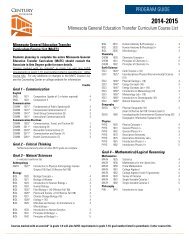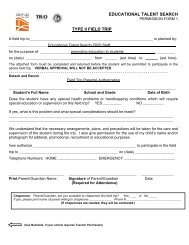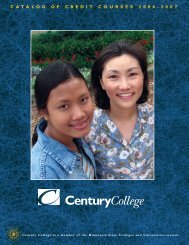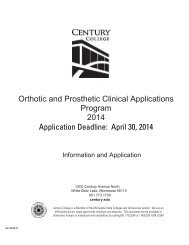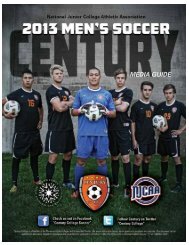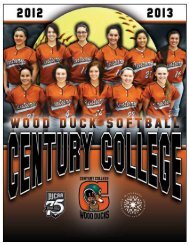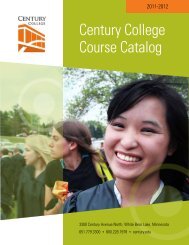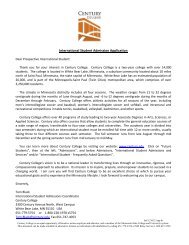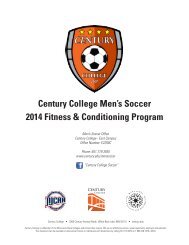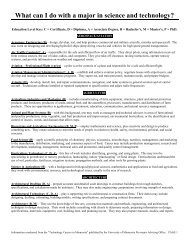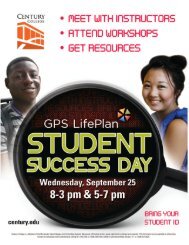2010-11 Course Catalog - Century College
2010-11 Course Catalog - Century College
2010-11 Course Catalog - Century College
Create successful ePaper yourself
Turn your PDF publications into a flip-book with our unique Google optimized e-Paper software.
7 <strong>Course</strong> Descriptionsa grade of “C” or higher. Restriction: Closedto students who have already earned credit forBiology 1024, Human Biology.Human BiologyBIOL 1024 3 CreditsMnTC: Goal 03This course is a survey of the humanorgan systems by structure and function.Organ systems include integumentary,skeletal, muscular, nervous, endocrine,circulatory, respiratory, digestive, urinary,and reproductive. The scientific method ofinquiry, human reproduction, developmentand heredity are other topics integrated intothe biology of the human body. This courseis designed for students who wish to gaina better understanding of the biology of thehuman body, including liberal arts majors.Prerequisite: Assessment score placementin RDNG 1000, or completion of RDNG 0090with a grade of “C” or higher. Restriction:Closed to students who have earned creditin BIOL 1023, 2031, 2032, 2040 or 2045.Recommendation: High school biology orBIOL 1020 or equivalent.Field BiologyBIOL 1025 4 CreditsMnTC: Goals 03 & 10This is a lab science course dealing withinterrelationships between environmentalinfluences and organisms as well as surveyingflora and fauna. Concerns considered includeclimate change, ozone depletion, groundwater contamination, acid rain, and hazardouswaste disposal. This is an experience-centeredcourse in which students have the opportunityto learn fundamental environmental principles,basic concepts of biology, and conservationthrough integrated laboratory and lecturepresentation and field work. This is a labscience general education course.Prerequisite: Assessment score placement inRDNG 1000, or completion of RDNG 0090 witha grade of “C” or higher. Recommendation:High school biology or BIOL 1020 or equivalent.Plants and SocietyBIOL 1026 4 CreditsMnTC: Goals 03 & 10This is a lab science course dealing withthe biological, historical, and culturalperspectives of roles plants have played inhuman civilizations. The course begins with<strong>11</strong>2 <strong>Century</strong> <strong>College</strong> <strong>2010</strong>-20<strong>11</strong>an overview of roles of plants in our dailylives and follows with theories of the originsof agriculture, while integrating discussionsof benefits of hundreds of plants and plantproducts. Also considered are the potential ofyet to be discovered benefits of many plants.Laboratory demonstrations provide studentswith direct access to plants and plant productsnecessary to everyday life. This is a labscience course intended for liberal arts majorsand for students with a general interest inplant biology.Prerequisite: Assessment score placement inRDNG 1000, or completion of RDNG 0090 witha grade of “C” or higher. Recommendation:High school biology or BIOL 1020 or equivalent.EcologyBIOL 1028 4 CreditsMnTC: Goals 03 & 10This is a lab science course covering the basicconcepts of ecology, including physical factorsthat influence the distribution and abundanceof organisms, population regulation andinteractions, nutrient cycling and energy flow,community change and succession. Naturaland human disturbances of ecosystemsand the concept of sustainability will alsobe integrated within the basic concepts ofecology. The major biomes of Minnesota -prairie and coniferous and deciduous forests- will be explored in relationship to theseconcepts. The course is intended to be a labscience general education course.Prerequisite: Assessment score placement inRDNG 1000, or completion of RDNG 0090 witha grade of “C” or higher. Recommendation:High school biology or BIOL 1020 or equivalent.Microbes and Society: AnIntroduction to MicrobiologyBIOL 1029 4 CreditsMnTC: Goal 03Microbes and Society introduces studentsto the biology of the major microbial groups,their role in our everyday existence, and themethods of scientific inquiry. Contemporarytopics, such as genetic engineering,bioterrorism, antibiotic resistance,biotechnology, emerging infectious diseases,and the consequences of public policies on theemergence, spread, and control of infectiousdisease will be examined. The laboratorywill acquaint students with basic techniquesused in the handling of microorganisms,and investigate the properties and usesof microbes. This course is intended forstudents who require a laboratory sciencecourse to fulfill general education or degreerequirements. This course is not intended forstudents who require a microbiology coursefor Nursing, Pharmacy, Dental Hygiene orother allied health programs.Prerequisite: RDNG 0090 with a grade of “C”or higher, or assessment score placement inRDNG 1000.Principles of Biology IBIOL 1041 5 CreditsMnTC: Goal 03This is a lab science course that provides ageneral introduction to biological principles.Topics include the scientific method, molecularand cellular biology, energy acquisition anduse, cell reproduction, genetics, ecology,and evolution. Laboratory exercises providestudents with practical means to understandbasic biological principles. This is a laboratoryscience course intended for biology andrelated liberal art majors and for preprofessionalstudents.Prerequisite: Assessment score placement inRDNG 1000, or completion of RDNG 0090 witha grade of “C” or higher. Completion of CHEM1020 and BIOL 1020 with a grade of “C” orhigher, or high school biology and chemistrywithin the last three years.Principles of Biology IIBIOL 1042 5 CreditsMnTC: Goal 03This is a lab science course dealing witha taxonomic survey of the major groupsof organisms. It is a continuation of BIOL1041. Topics include phylogeny, morphology,development, and structure-functionrelationships of viruses, bacteria, protistans,plants, fungi and animals. Laboratory exercisesconsist of practical identification of variousorganisms and structures. This is a laboratoryscience course intended for biology andrelated majors.Prerequisite: BIOL 1041 or equivalent.General Biology Independent StudyBIOL 1790 1 - 3 CreditsAn opportunity for an in-depth study of aparticular topic.Prerequisite: Consent of instructor and dean.




